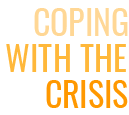What are the most pressing challenges of governments in the second half of 2020? We have asked 700 selected politicians and public servants at the national and local levels in our network to participate in a survey. The following four insights drawn from our network’s responses reveal an interesting prioritisation of topics.
1. Solving budgetary problems and creating jobs will continue to keep governments occupied in 2020
It is obvious that the Covid-19 pandemic and its secondary effects have harmed the business sector. This does not only negatively affect employment numbers, but also governments’ tax income and subsequently budgets on all levels. Thus, mayors, elected politicians as well as civil servants are working to reduce the negative effects on budgets and government services. Additionally, finding ways to stimulate local, regional and national economies and to help businesses to create new jobs are on top of governments’ agendas. These efforts will continue for the rest of the year and will remain on political agendas in 2020.
2. Apart from mitigating the effects of the coronavirus crisis, politicians and civil servants disagree on what other policy areas will keep governments busy in 2020
Besides budget and jobs, there is no consensus between politicians and civil servants about the other pressing issues which will keep governments busy in the second half of 2020. On the one hand, politicians anticipate that health and care issues will remain at the top of their agenda. On the other hand, public servants foresee their focus on digitalisation and climate change. One could argue that this directly reflects the work environments of the two groups: whereas politicians think about how they can make systems (e.g. health and care) more resilient for future crises, civil servants are more focused on how (their) daily work will be digitalised and which measures need to be implemented.
3. Politicians feel better equipped than civil servants to tackle pressing issues
Only one quarter of civil servants believe they have the necessary resources to tackle the most urgent policy matters in the second half of 2020. Apart from more financial resources and better infrastructure, they ask for new ways of bringing expertise and knowledge into governments (e.g. cooperations with other governments, citizens, scientists). Contrary to this, almost half of the surveyed politicians believe they have the necessary resources to tackle the most relevant policy challenges in 2020.
4. Both politicians and civil servants want to learn from other governments how to tackle the climate crisis.
Again, there is no full consensus among politicians and civil servants regarding the policy areas for which they want to learn from other governments. Whereas politicians concentrate on education and climate change policies, civil servants want to learn about digitalisation and how other governments intend to reach climate goals. It seems that climate change continues to be a top priority for governments and the coronavirus crisis only partially shifts awareness from respective projects and policies.


